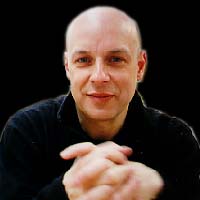| The Third Culture | ||||||||
|
|
A Big Theory Of Culture A Talk With Brian Eno [4.1.97]
Introduction by Here's what I greatly appreciate about Brian Eno, apart from the pleasure I take from his friendship and from the pure delight of his music and art... Like all significant artists, Brian works from a deep and complex and evolving frame of reference. Unlike most artists, and like most scientists, he talks about that frame of reference. He's not worried that your experience of his art might be sullied by your understanding something about what he's up to � rather the opposite: he would like to include you in the process. This is risky, but valuable. It's risky because once viewers or listeners know what the artist is attempting, they have criteria for judging when he has failed. Brian's approach is valuable because it is so inviting. The informed viewer or listener is invited to think like an artist and therefore in a sense to become an artist. This is good for art and good for civilization. I think that's what makes Brian's book, A Year With Swollen Appendices, so appealing. Brian is famous, and that makes us interested, and he's charming in print as well as in person, so we engage him comfortably. But what gets us about the book is how revealing it is. We see what a good artist does with his mind all day. It's inspiring. There's a further benefit to telling all, this time to the artist. By not keeping his frame of reference secret, Brian is freed from binding allegiance to whatever he was thinking when he first became successful. You don't cling to secrets you've told. You move on, and your work keeps being surprising as a result. Maybe this approach works best with artists who are easily bored. Brian is, after all, the author/composer/performer of the tune (now a well-known meme), "Been there, done that." |
